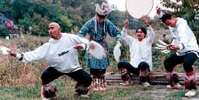Pamyua’s Song of the Wild

 3:57
Gregg McVicar
3:57
Gregg McVicar
Artic soul stew: Afro, Yupic and Eskimo music.
Broadcast: Nov 5 2003 on NPR Day to DaySeries: Earthsongs Subjects: Native, Music, Environment
Profile: Pamyua demonstrates their unique style of music that includes various animal calls
November 5, 2003 from Day to Day
MADELEINE BRAND, host: I'm Madeleine Brand, and this is DAY TO DAY.
The Sixth Annual Native American Music Awards will be held later this month. Among the Nammy--that's like Grammy--nominees for group of the year is Pamyua, an Alaskan singing and traditional dance quartet that merges Afro, Yupik and Inuitic Eskimo influences. Pamyua's arctic-soul stew defies easy description, but one distinct feature is the group's mimicry of all sorts of wild animal sounds.
Unidentified Man #1: When we hunt geese, like Canadian geese or emperor geese, we like--for me, growing up hunting, we learned how to make those geese calls. And one of them is--(imitates goose call), and we would wave our arm, and they come. And that's one of our trade secrets when we hunt them. We still--to this day, it's a necessity.
Unidentified Woman: And then the sea gull?
Unidentified Man #1: The sea gull. (Imitates sea gull)
Unidentified Man #2: I can't do that one.
(Soundbite of laughter)
Unidentified Man #1: Yeah.
Unidentified Man #2: But I can go--(imitates seal). That's a kind of seal call.
Unidentified Man #3: That's probably our signature call. And we use it, like, when we're traveling. Like, say we're in Copenhagen, in the streets, and we're like...
Unidentified Man #1: Yeah.
Unidentified Man #3: ...you see somebody and they don't see you, in the group, like--(imitates seal).
Unidentified Man #2: Yep.
Unidentified Man #1: Yeah.
Unidentified Man #3: And then that's like--yeah, hands down, you know who it is.
Unidentified Man #2: That's who it is. You know who it is.
Unidentified Man #1: Yeah.
Unidentified Man #3: And we also use it--a lot of our friends...
Unidentified Woman: Uh-huh.
Unidentified Man #3: ...and people back home...
Unidentified Man #1: Yeah.
Unidentified Man #3: ...use that call. If we do it, they know who's coming. Oh!
Unidentified Man #2: So do you want me to start?
Unidentified Woman: Mm-hmm.
(Soundbite of Pamyua performing)
PAMYUA: (Singing in foreign language)
(Soundbite of laughter; animal call)
(Soundbite of music)
Unidentified Man #2: The dancers are expressing themselves vocally as well as with their face, their arms, their neck, everything, and they're--(makes animal call), and they're just dancing. And as the song's going, when you need more energy, like with Yupik dancing, then you just make calls in certain places and it just supports that energy.
Unidentified Man #3: So we do a lot of call and answer, too.
Unidentified Man #2: So we try to do that when we do songs, like when we're performing with a band, it gives us a lot of opportunity because we want to groove, we want to dance and get down. And when we're dancing, it's just kind of--it's like an involuntary thing that happens just to make these calls, like, when we're going to make a move, get down, we just--(makes animal call) or--you know, make some kind of noise.
(Soundbite of Pamyua performing)
PAMYUA: (Singing in foreign language)
(Soundbite of animal calls)
BRAND: That was Pamyua. Their live album, "Caught in the Act," has been nominated for three Native American Music Awards, including record of the year and group of the year.
This piece came to us from "Hearing Voices(ph)," and was produced by Greg McVicker(ph).
This is DAY TO DAY. I'm Madeleine Brand.

